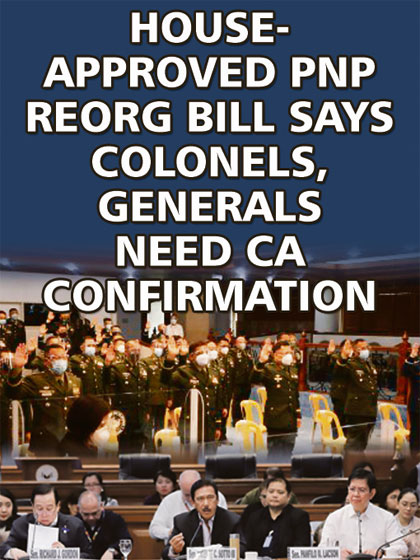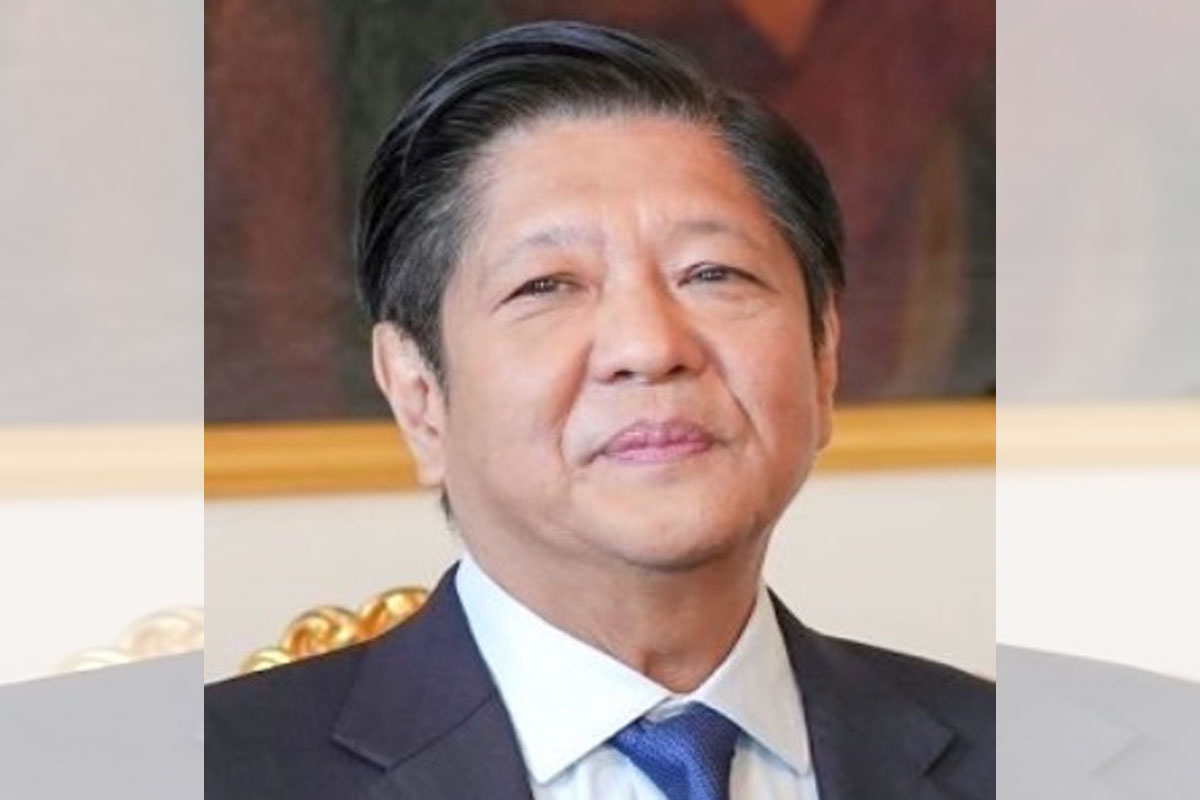
House-approved PNP Reorg Bill says colonels, generals need CA confirmation
 A HOUSE-approved proposed Philippine National Police Reorganization Bill will determine who will be given the ‘hire and fire’ power in the 227,000-strong organization which is continuing its strict internal cleansing drive vis-à-vis with its massive modernization program to better equip its men with the needed ‘move, shoot, communicate and investigate’ tools, the Journal Group learned yesterday.
A HOUSE-approved proposed Philippine National Police Reorganization Bill will determine who will be given the ‘hire and fire’ power in the 227,000-strong organization which is continuing its strict internal cleansing drive vis-à-vis with its massive modernization program to better equip its men with the needed ‘move, shoot, communicate and investigate’ tools, the Journal Group learned yesterday.
At the same time, it will also mean that police colonels up to generals will have to pass the scrutiny of the powerful Commission on Appointments.
Under the proposed PNP Reorganization Bill, Section 31 of Republic Act No. 6975 or the Department of Interior and Local Government Act of 1990 will be amended to the following: Appointment of PNP Officers and Members to Position and Rank.’
“The appointment of the officers and members of the PNP shall be effected in the following, the proposed amendment to RA 6975 says.
Patrolman/Patrolwoman to Police Executive Master Sergeant-appointed by the PNP Regional Director for regional personnel’ Area Police Commander for APC personnel; Director of National Support Units for NSU personnel; or by the Chief of the PNP for the National Headquarters personnel and attested by the Civil Service commission.
Police Lieutenant to Police Lieutenant Colonel—appointed by the chief of the PNP as recommended by their immediate superiors to the position in accordance with the approved Staffing Pattern and the corresponding ranks to be attested by the Civil Service Commission.
On the other hand, Police Colonel to Police Lieutenant General to be appointed by the President upon recommendation of the Chief of the PNP with proper endorsement by the Chairman of the Civil Service Commission and the National Police Commission to key positions and to the corresponding ranks and subject to confirmation by the Commission on Appointments.
Lastly, Police General—appointed by the President to the position of Chief of the PNP From among the senior officers down to the rank of Police Brigadier General in the service subject to confirmation by the Commission on Appointments provided that the Chief of the PNP shall serve a tour of duty not to exceed four (4) years; provided further that in times of war or other national emergency declared by Congress, the President may extend such tour of duty.
The proposed PNP Reorganization Plan gives the PNP Chief more authority to carry out his job and serve a maximum 4-year term subject to confirmation by the CA
As provided for in the proposed amendments to RA 6975, Section 26 which refers to the ‘Powers, Functions and Term of Office of the PNP chief will be amended.
It says that the command and direction of the PNP shall be vested in the Chief of the PNP who shall have the power to select the members of his Command Group from among the qualified officers in the service.
Provided, that the Deputy chief of the PNP for Administration and the Deputy Chief of the PNP for Operations shall be appointed by the President upon the recommendation of the National Police Commission.
The command and direction of the PNP shall be vested in the Chief of the PNP who shall have the power to direct and control tactical as well as strategic movements, deployment, placement, utilization of the PNP or any of its units an personnel, including its equipment, facilities and other resources.
Such command and direction of the Chief of the PNP may be delegated to subordinate officials with respect to the units under their respective commands, in accordance with the rules and regulations provided by the Commission.
The Chief of the PNP shall have the power to issue detailed implementing policies and instructions regarding personnel, funds, properties, records, correspondence and such other matters as may be necessary to effectively carry out the functions, power and duties of the Bureau.
The proposed amendment to RA 6975 says that “the Chief of the PNP shall be appointed by the President from among the senior officers down to the rank of Police Brigadier General subject to confirmation by the Commission on Appointments.
Provided, that the Chief of the PNP shall serve a term of office not to exceed four (years; and shall be compulsorily retired at the maximum tenure in position herein prescribed or at age fifty-six (56), whichever is earlier.
Provided, further that in times of war or other national emergency declared by Congress, the President may extend such term of office.
To enhance police operational efficiency and effectiveness, the Chief of the PNP may constitute, modify or merge PNP units and offices as may be necessary including the corresponding changes in the number and distribution of ranks or otherwise implement necessary adjustments in the organizational structure, staffing, functions and functional relationships subject to the approval of the Commission.
Provided that no PNP units and offices headed by a Police Brigadier General can be created unless provided for by law.
The House Committee on Public Order and Safety chaired by Laguna (1st District) Representative Dan S. Fernandez has approved the proposed reorganization plan of the police force, PNP Director for Plans, Major Gen. Bernard M. Banac told the Journal Group.
According to the official, the House Committee on Public Order and Safety has adopted the report and draft bill prepared by Technical Working Group chairman, retired Police General-turned Antipolo City (2nd District) Rep. Romeo M. Acop.
“It will be presented during the plenary sessions of the House of Representatives. Hopefully, it will be categorized as Priority Bills and certified as urgent by both Houses,” said the official who has been commended by PNP chief, General Rodolfo S. Azurin Jr. for doing an excellent job in Congress.
Maj. Gen. Banac, a former PNP spokesperson who also became a PNP Training Service director and Police Regional Office 8 commander in Eastern Visayas said they have gotten the full support of House Speaker Ferdinand Martin T. Romualdez and Senate President, Senator Jose Miguel ‘Migz’ F. Zubiri in their bid to further reform the 227,000-strong police force and improve its ‘move, shoot, communicate and investigate’ capabilities under the administration of President Ferdinand ‘Bongbong’ R. Marcos Jr.
The proposed PNP Reorganization Plan calls for the adaptation of the current structure of the Philippine National Police including the pay and allowances of PNP personnel, amending for the purpose Sections 25,26,29,30,31,35, 36 and 67 of Republic Act No. 6975 otherwise known as the ‘Department of the Interior and Local Government Act of 1990,’ as amended and Section 32 or RA No. 8551 otherwise known as the Philippine National Police Reform and Reorganization Act of 1998 and appropriating funds therefor.




















